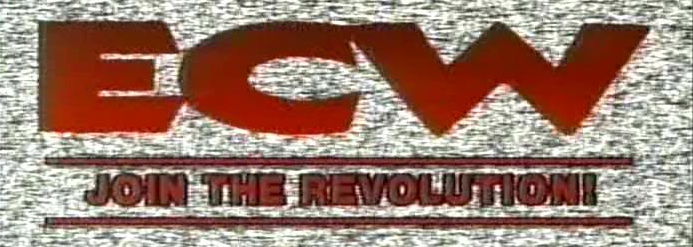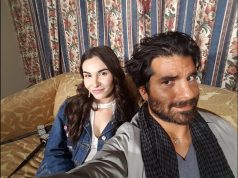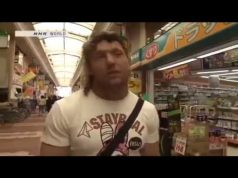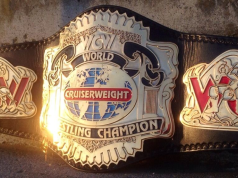
I began watching wrestling on a weekly basis in the fall of 1997 as a chubby and not-particularly-popular eleven year old with a penchant for jumping into new interests with both feet. There’d been a number of other preoccupations that commanded my attention until that point – Universal Monsters, Phillies baseball, comic books, etc – each of which I had flung myself into with unbridled enthusiasm. At first, wrestling was no different. Soon, though, the intensity of my infatuation with the world of professional wrestling had soared into uncharted territory. Other boyhood hobbies typically maintained my interest for a little while, but my investment in them would wane as the original excitement over their discovery faded. Not the case with the squared circle. Where my fervor concerning other interests would historically fade as time went on, my fascination with wrestling only grew – and rapidly. By the end of the year, half of my wardrobe had been replaced with nWo T-shirts. I’d begun hanging out with a new circle of friends, fellow wrestling fans. Instead of memorizing Scott Summers and Kurt Wagner as the real names of the X-Men, I was dedicating names like Page Falkinburg and Mark Calloway to memory. The slang that I used was evolving to incorporate phrases like “heel” and “pet coon.” In short, wrestling changed my life.
From day one, my fandom wasn’t something that existed in a vacuum on Monday nights. It was something that seeped into every corner of my life. How I conducted myself at school on a Wednesday, where my allowance would be spent on Saturday afternoon, it was all influenced by this new passion. Sometimes, I like to step back and appreciate the ways that wrestling has affected other areas of my life over the years, directly or indirectly, for better or worse. It is, after all, the entertainment medium that has done the most to shape me as a person. One aspect of my youth that was indelibly altered by the spectacle of pro wrestling was my exposure to, and taste in, popular music. For the first decade-plus of my life, my musical knowledge was a mere reflection of my parents’. Sundays with Sinatra and the Beatles Anthology were fine and dandy, but not being a very social child, I didn’t have the influence of peers to help me discern what modern music was worth listening to. Luckily, there was a little promotion based out of my hometown of Philadelphia that was willing to take my hand and help me transverse the musical landscape of the 1990s.
![ECW_Extreme_Music[1]](https://prorasslin.club/wp-content/uploads/2016/08/ecw_extreme_music1.jpg) Extreme Championship Wrestling’s Hardcore TV, a one hour program, aired at 10 PM on Saturday nights, channel 48, WGTV. It was during this weekly 60-minute course that the wrestlers and personalities of ECW would guide me through a variety of musical genres, from the hard rocking riffs of AC/DC’s Highway to Hell that accompanied the brothers from Dudleyville on their march to the ring to the alternative stylings of Beck’s Loser that’ll forever put me in mind of perpetual underdog Mikey Whipreck. For the first time in my life, I was developing a taste for music that was my own – bands that I had been exposed to by the outside world, not from within my own household. I began spending hours every week adding MP3s to my Napster queue, impatiently waiting as the songs I’d heard on Hardcore TV downloaded through my 56k modem. It wasn’t long before I’d run the well dry. Within months, I had six CD-Rs full of ECW entrance themes – CDs that I listened to almost exclusively. I had my favorites of course, Nirvana’s Heart Shaped Box (used by Beulah McGillicutty), and White Zombie’s Thunder Kiss ’65 (The Pitbulls) chief among them. Not surprisingly, once there were no entrance anthems left to download, I found myself forking my money over to Tower Records in exchange for albums like Nevermind and Hellbilly Deluxe. Before I knew it, I’d compiled a pretty viable CD collection, featuring the likes of The Offspring, Beastie Boys, and Smashing Pumpkins. Of course, I even owned the ECW-produced Extreme Music and Anarchy Rocks albums, which featured almost none of the original artists performing the themes. But hey, it was the only place to get Harry Slash & The Slashtones This Is Extreme.
Extreme Championship Wrestling’s Hardcore TV, a one hour program, aired at 10 PM on Saturday nights, channel 48, WGTV. It was during this weekly 60-minute course that the wrestlers and personalities of ECW would guide me through a variety of musical genres, from the hard rocking riffs of AC/DC’s Highway to Hell that accompanied the brothers from Dudleyville on their march to the ring to the alternative stylings of Beck’s Loser that’ll forever put me in mind of perpetual underdog Mikey Whipreck. For the first time in my life, I was developing a taste for music that was my own – bands that I had been exposed to by the outside world, not from within my own household. I began spending hours every week adding MP3s to my Napster queue, impatiently waiting as the songs I’d heard on Hardcore TV downloaded through my 56k modem. It wasn’t long before I’d run the well dry. Within months, I had six CD-Rs full of ECW entrance themes – CDs that I listened to almost exclusively. I had my favorites of course, Nirvana’s Heart Shaped Box (used by Beulah McGillicutty), and White Zombie’s Thunder Kiss ’65 (The Pitbulls) chief among them. Not surprisingly, once there were no entrance anthems left to download, I found myself forking my money over to Tower Records in exchange for albums like Nevermind and Hellbilly Deluxe. Before I knew it, I’d compiled a pretty viable CD collection, featuring the likes of The Offspring, Beastie Boys, and Smashing Pumpkins. Of course, I even owned the ECW-produced Extreme Music and Anarchy Rocks albums, which featured almost none of the original artists performing the themes. But hey, it was the only place to get Harry Slash & The Slashtones This Is Extreme.
Many of the bands I started listening to as a result of ECW are ones that I still hold close to my heart today. Perhaps more importantly than that, they gave me some common ground on which to stand when forging friendships. I finally knew contemporary music, and could parlay what ECW had taught me about it into conversations with just about anyone. I’d made friends who listened to grunge – I knew grunge, Tommy Dreamer had taught me. You want to talk heavy metal? I learned about that from Rob Van Dam. If 80’s rock is more your style, I’d be happy to discuss – Taz & The Franchise made sure I was well-educated on the matter. I remember a time riding in the backseat of my parents station wagon with one of my homemade ECW compilations playing. Even my father, who had largely disapproved of the music that I was now claiming as my own, found something to appreciate in the Kingsmen’s Louie, Louie, the entrance theme of the late Louie Spicolli. ECW’s music library had something for everyone, and it was everything to me.
 For me, the performers of ECW are more strongly linked to their respective themes than those of any other promotion. Their music is so deeply ingrained in their characters, it’s hard to think of them without having their signature ballads spring to mind. This becomes painfully evident when revisiting ECW programming today on the WWE Network. Lacking the licensing for the vast majority of songs used in the original ECW, the WWE has been forced to dub over what you’d expect to hear with generic background music. I started watching an episode of Hardcore TV last week and was so distracted by the musical alteration that I had to prematurely quit on the selection. The show opened with the FBI entering to a funky disco beat that lacked the hip-hop flavor of N’Trance’s Staying Alive. Worse, when their opponents The Gangstanators entered, they weren’t accompanied by Dr. Dre and Ice Cube, but instead by a Naughty By Nature inspired instrumental beat that lacked the punch of the song it was replacing. When I was first introduced to New Jack as a child, I knew immediately that he was one bad mother, and I knew this because his entrance music told me that he was “doomed to be a killer” since he “came out the nutsack.” It was the dirtiest song lyric that I had ever heard. Of course, that statement was only true for about another ten seconds, because as his music continued playing throughout the bloodbath of a match that followed, the lyrics only got raunchier. The song told me who New Jack was just as much as his attire, his brutality, or his pre-opponent-bashing guitar picking did.
For me, the performers of ECW are more strongly linked to their respective themes than those of any other promotion. Their music is so deeply ingrained in their characters, it’s hard to think of them without having their signature ballads spring to mind. This becomes painfully evident when revisiting ECW programming today on the WWE Network. Lacking the licensing for the vast majority of songs used in the original ECW, the WWE has been forced to dub over what you’d expect to hear with generic background music. I started watching an episode of Hardcore TV last week and was so distracted by the musical alteration that I had to prematurely quit on the selection. The show opened with the FBI entering to a funky disco beat that lacked the hip-hop flavor of N’Trance’s Staying Alive. Worse, when their opponents The Gangstanators entered, they weren’t accompanied by Dr. Dre and Ice Cube, but instead by a Naughty By Nature inspired instrumental beat that lacked the punch of the song it was replacing. When I was first introduced to New Jack as a child, I knew immediately that he was one bad mother, and I knew this because his entrance music told me that he was “doomed to be a killer” since he “came out the nutsack.” It was the dirtiest song lyric that I had ever heard. Of course, that statement was only true for about another ten seconds, because as his music continued playing throughout the bloodbath of a match that followed, the lyrics only got raunchier. The song told me who New Jack was just as much as his attire, his brutality, or his pre-opponent-bashing guitar picking did.
In closing, I attribute a lot of who I am today to professional wrestling, and my appreciation of contemporary music is most certainly part of that. I think that I’ve developed a fairly eclectic musical taste over the years, and without ECW setting me down that path, I don’t know if that would be the case. Beyond my own personal experience with it, it would be hard for anyone to argue against the idea that Paul Heyman and his boys did a fine job of selecting songs that perfectly complimented their talent. From the unmistakable opening chords of Enter Sandman, to the Swamp Candle’s original composition that captured the essence of the bWo so perfectly, to the backstage interview vignettes set to Misirlou, the musical accompaniment for Hardcore TV and beyond was impeccably selected. What’s your fondest musical memory from the land of extreme?










